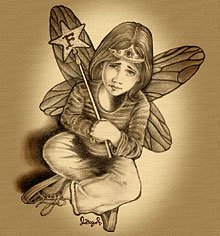Children Have to Grow Up Too Fast
Something is lost when little red wagons and mud pies make way for worksheets and tests.
Your content has been saved!
Go to My Saved Content.
She waltzes into my room on winged feet -- all 3 feet and abit of her, with a pixie cut and huge brown eyes. She is Katy(not her real name), and she is in the first grade. As everyoneelse settles down, Katy twirls in a dizzying display of excessenergy. She is wearing her favorite outfit -- a rainbow ponchoand a tiara with pink feathers. The rest of the class sitson the rug, crisscross applesauce. They stare up at me expectantly. Katyis trying to lie across my lap and peer up into my face. She slithers down,bounces up again, and moves to her desk to see what treasures might be inher backpack. Her bottom has never touched her chair. I invite her back tothe group and sit her right next to me -- her favorite place in the room.
A little young, I tell myself on the first day. Not ready for first grade andthe rigors of state standards. I'm new to the school so I do not know herhistory. Perhaps she's just young for her age. I can't help thinking someonedropped the ball here. She's a kindergartner dressed in first-grade clothing.
When I check her file in the office, I am dumbfounded by an inch-thickIEP folder. This is not good news. An Individualized Education Programusually signals some serious area of concern. The plan spells out goals forthe student and how the teacher will monitor and assess the accomplishmentof those goals. Benchmarks are set. Meetings are held. I've neverhad a first grader with an IEP. Most students come equipped with a slimfolder holding their vaccination records and birth certificate. What couldpossibly be wrong with this girl that warrants this level of scrutiny?
The answer: nothing. She has an older brother with a learning disabilityand anxious parents who want to make sure Katy doesn't "fallthrough the cracks." I keep reading, looking for a diagnosis, some indicationthat there is something wrong with this sprite. But the only thingI see is that she "doesn't know her entire alphabet." She can't write allher numbers to thirty. She's "inattentive" during instruction.
There is nothing wrong with Katy except that she is a kindergartnerdeprived of kindergarten. Ten years ago she would have been in thedress-up corner in front of the mirror, draping feather boas across herthin shoulders. But on this particular day, she's a first grader with anIEP and goals that are unattainable for someone at her stage of development.She will go to special classes three times a week to make up forher "deficits." She will continue to smile boldly, but soon she will startto wonder what is wrong with her. She will leave our classroom threetimes a week and trudge, not dance,down to room 15. She will start tofeel the weight of those goals. Thebenchmarks will pinch just a bit.
Katy is not my first kindergartner.In the past five years, as expectationshave continued to expand at each grade level, teachers have scrambled tohelp students feel successful. A good proportion of my class is not at gradelevel. They are taking multiple-choice tests and filling in bubbles with theanxiety of their older siblings. We throw around terms like "algebra" and"response to literature" to six-year-olds who are barely decoding words. Wepush and cajole and yes, sometimes secretly curse the child with her headin the clouds. We are accountable. We are observed. Our jobs may dependon the ability of our students to understand the subtle distinctionbetween strategies like "predict" and "infer."
There is no kindergarten. It has gone the way of the little red wagon andmud pies. The time when children learned how to go to school, how to usea tricycle, or wait their turn on the swing is gone. These were importantskills -- vital to success in the grades to come. We do not have time to teachthem now. We have worksheets that need completing. We have take-homebooks to copy and homework packets to staple. We have accountability.
I look down at Katy while she copies the words from the whiteboard.Every now and then, she holds up her paper for me to see, and smiles. Ilove how the light dances off the rhinestones on her tiara. And I wonderhow long it will be before someone tells her that she can't wear hats inclass and she can't dance in the hallways. I will miss the pink feathers andrainbow poncho. But while she is mine, I willdance around the rules just a little and find placesfor her to stand, not sit. I will teach her whatI can to the best of my ability. I will hold off, aslong as I can, the weight of the file that dogs herfootsteps. And I'll look for a rainbow ponchoof my own to remind me that the Katys of thisworld just might be on the brink of extinction.
Credit: Indigo Flores